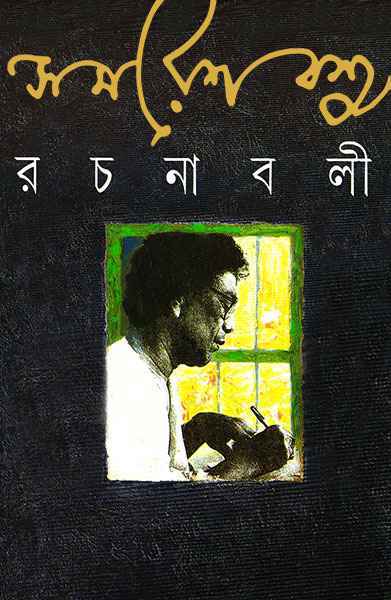Samaresh Basu Rachanabali 6
Samaresh Basu Rachanabali 6 is backordered and will ship as soon as it is back in stock.
Couldn't load pickup availability
Genuine Products Guarantee
Genuine Products Guarantee
We guarantee 100% genuine products, and if proven otherwise, we will compensate you with 10 times the product's cost.
Delivery and Shipping
Delivery and Shipping
Products are generally ready for dispatch within 1 day and typically reach you in 3 to 5 days.
🔹 Author: Samaresh Basu
🔹 ISBN: 9788177561845
🔹 Cover: Hardcover
🔹 Pages: 842
🔹 Weight: 1114 grams
About Samaresh Basu
Samaresh Basu continues to hold a special place in Bengali literature, often referred to as the "Prince of Bengali Literature", a title that, while debated by some, cannot be denied when looking at the sheer breadth and depth of his literary contributions. His works, spanning across diverse themes, reveal the vastness of his talent, much like a towering tree in a dense forest.
Basu was not confined by any moralistic ideals in his life and writing. Instead, his works focused on the reality of life and human nature in all its complexity. His belief was that life and literature are inseparable, that the writer's experiences are crucial to their creations, and that life itself is a greater teacher than literature.
His works reflected a raw, unfiltered portrayal of humanity, with an emphasis on the interconnectedness of the physical and emotional realms of human experience. Life as a living, breathing force was central to his writing, making his works stand out for their vivid realism, and, at times, for their controversial subjects. Basu explored the human condition in all its contradictions, believing that to truly understand life, one must not only be a life artist but also a life hunter, experiencing the full spectrum of emotions and events.
Contents of Volume 6
In this sixth volume of Samaresh Basu Rachanabali, readers will find an array of works that continue his journey through the vast landscape of human experience. This volume features five novels, each exploring complex themes, as well as a profound reflection on middle-class life.
Novels:
- Yug Yug Jiye (Living Through the Ages)
- Raktim Basanta (Crimson Spring)
- Chhaya Dhaka Mon (A Mind Covered by Shadows)
- Hariye Paoa (Lost and Found)
- Macbeth: Rangmanch Kolkata (Macbeth: The Stage of Kolkata)
These works display Basu’s characteristic psychological depth, portraying the inner struggles and transformations of the human spirit. They reflect his ability to capture the complexities of relationships, societal challenges, and the emotional turmoil of individuals caught in the web of their own desires and experiences.
1. Yug Yug Jiye (Living Through the Ages)
This novel likely explores the concept of time and generational experiences. The title suggests a journey through history, traditions, and the changing fabric of society. The story may delve into the continuity of human experience, examining how people endure the ravages of time and how individuals adapt to evolving eras.
2. Raktim Basanta (Crimson Spring)
"Crimson Spring" evokes a vivid image of change, with the spring season symbolizing renewal and growth, while the crimson hue hints at passion, conflict, or even bloodshed. This novel could reflect themes of emotional rebirth, where characters may experience a personal transformation or catharsis during a period of turmoil or growth.
3. Chhaya Dhaka Mon (A Mind Covered by Shadows)
The title here suggests a state of mental obscurity or emotional confinement. The novel likely explores the psychological battles of its characters, particularly the shadows of the mind—fear, doubt, and despair. Basu may have used this novel to highlight the inner battles faced by individuals and how these conflicts shape their perceptions of the world around them.
4. Hariye Paoa (Lost and Found)
This story could center around loss, both material and emotional, and the journey of rediscovery. It may delve into the concept of identity crisis, as characters try to make sense of their place in the world after significant personal or emotional loss. The theme of rediscovery could offer a glimmer of hope amid the struggles, suggesting that loss can lead to renewal.
5. Macbeth: Rangmanch Kolkata (Macbeth: The Stage of Kolkata)
Basu's take on Shakespeare’s Macbeth through the lens of Kolkata promises a unique fusion of the classical and the modern. This work might be a reinterpretation of the famous tragedy, set in the contemporary context of Kolkata, where ambition, power, and guilt continue to resonate. The stage could serve as a metaphor for life itself, with characters playing their roles in the dramatic story of politics, betrayal, and self-destruction.
Themes and Style in Volume 6
Basu's writing in this volume explores his deep engagement with middle-class life, personal identity, and the complexity of human emotions. He uses a blend of realism, symbolism, and psychological exploration to uncover the inner lives of his characters, their struggles with identity, faith, and society.
His treatment of time and generational narratives in Yug Yug Jiye suggests a reflection on how individuals are shaped by history, while Raktim Basanta introduces a more intimate exploration of personal change. Chhaya Dhaka Mon and Hariye Paoa illustrate the psychological turmoil of characters, capturing their deep-seated fears, insecurities, and the emotional weight of their experiences. Lastly, Macbeth: Rangmanch Kolkata showcases Basu's ability to reimagine classic literature through a modern, local lens, placing universal themes in a contemporary context.
Conclusion
Samaresh Basu Rachanabali 6 is a continuation of Basu's unmatched literary exploration of the human spirit. With complex characters, rich storytelling, and a deep engagement with middle-class existence, this volume offers readers a chance to experience the evolution of a writer who was unafraid to tackle the deepest truths of life.
Basu’s works in this volume are a testament to his ability to blend emotion, philosophy, and realism, inviting readers to reflect on their own identities, relationships, and the passage of time. Through these novels, he continues his exploration of the mysteries of human existence, solidifying his place as one of the most important figures in Bengali literature.





